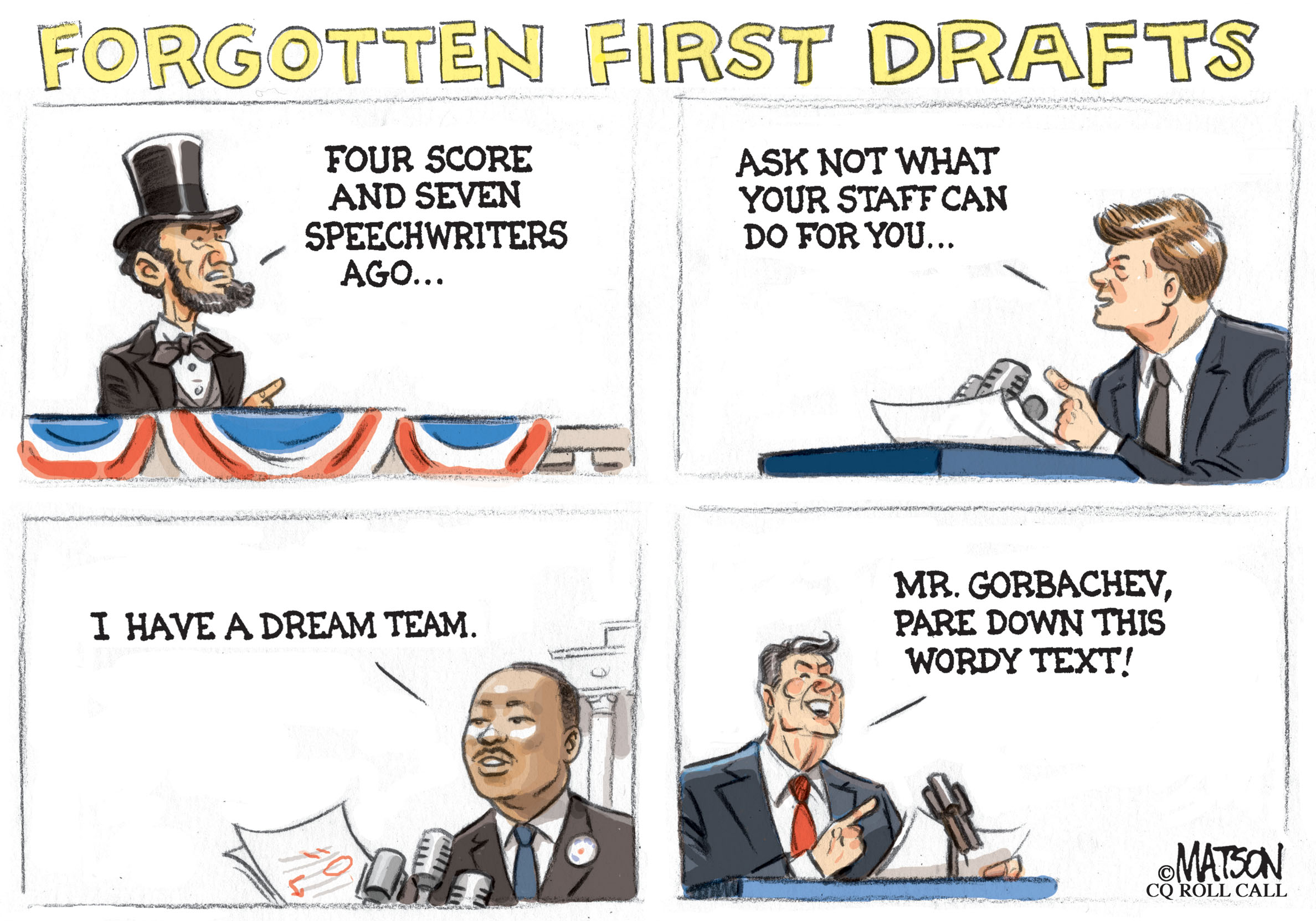Writing a speech for the boss? Two White House pros show you how to nail it
The best speechwriters are advocates for the audiences they’re trying to reach, Eric Schnure says

OPINION — Most job interviews for Capitol Hill speechwriters go something like this: “The senator needs remarks for tomorrow. You need to write the remarks.” No interview. No preparation. Just a last-minute assignment and an equally fast turnaround for a legislative assistant, a legislative correspondent or whichever press office staffer picked up the phone first.
Over at the White House, speechwriting jobs usually come with more requirements than physical proximity, but not always. Eric Schnure scored his first speechwriting job for Vice President Al Gore when he was working in the White House mail room and helping Gore’s understaffed speechwriter, Bob Lehrman, before and after sorting letters.
“I would go in really early to write speeches, open mail from 9 to 11 a.m., write speeches until 1 p.m., and then stay late writing speeches,” Schnure says. “I had no clue what I was doing. Bob literally taught me on the job.”
Luckily for new and aspiring speechwriters everywhere, Lehrman and his protégé Schnure have teamed up to publish an updated edition of Lehrman’s original handbook for writers and speakers, “The Political Speechwriter’s Companion.” Ten years after the first edition, the newest volume includes updated examples (think Cory Booker and Rand Paul instead of Dick Gephardt and Dick Armey); a look at the role of social media in political communications; and the incredible influence of Presidents Barack Obama and Donald Trump on rhetoric in American politics.
But first and foremost, it’s a detailed how-to for speechwriters, built around the same lessons Lehrman taught Schnure with red-lined drafts in the Eisenhower Executive Office Building — write for the ear, not the eye; use emotion, humor and stories to amplify facts; and most especially, keep it short and simple.
The foreword by Tennessee Republican Sen. Lamar Alexander illustrates all of those points — succinctly, of course — with a story about the advice former first lady Barbara Bush gave President George H.W. Bush as he approached a podium before a speech one day. “What should I talk about?” he asked her. “How about five minutes, George?”
A checklist for writers follows each section, both to eliminate the need for note-taking and to help writers literally check the boxes of effective preparation and execution. By the end, you and your boss will know your audiences, understand and speak to the issues they care about, and be able to avoid the pitfalls of disastrous delivery. (Tempted to thank every relative and town council member in the audience? Don’t do it.)
Most helpfully, Lehrman and Schnure have also included a section for speakers themselves, in addition to advice for writers, with tips on both memorable delivery and managing the challenges of having a staff member writing their speeches for them.
When it comes to politicians on the national stage, none has had a more profound impact on recent American rhetoric than Trump. Schnure said Democrats make a mistake discounting Trump’s simple words and phrasing or unconventional style, especially at rallies, because beneath the bluster lies a very effective communicator.
“People can process it and understand it in real time,” he says. “Trump is speaking visibly, then giving people an image or something that’s catchy to hold on to. Those are real tools.”
But along with Trump’s strengths, Schnure says he and Lehrman found the amount of dishonesty in the president’s speeches so unprecedented that they added an entire chapter to the book on ethics in public speaking.
“If you’re someone who cares about communications, you just have to take him to task for the lying,” Schnure says. “If you buy into that kind of rhetoric and accept it as a tool, you’re part of something that at some point can’t be fixed.”

On the Democratic side, Elizabeth Warren is not only matching Trump’s crowd size, she’s impressed Schnure as someone far more engaging on the stump than the Harvard professor image people may have had of her going into the campaign.
“There’s a comfort level with who she is, which comes across when she’s speaking,” he says.
Whether you’re a Hill staffer with a speech due tomorrow, or a candidate or member looking to raise your speaking game, two essential lessons underscore the entire book.
“First, language matters. People hear speeches in real time,” Schnure says. “That means it’s conversational, that it’s vivid and that you use stories and images that are memorable.”
And finally, he says, the best speechwriters are advocates for the audiences they’re trying to reach, not just champions for the leader they’re writing for.
“Any staffer can tell you what a bill or proposal means, but a great speech tells the audience why it has meaning in their lives and inspires them to do something about it,” Schnure says.





